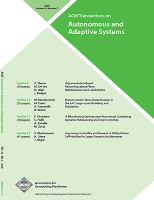
ACM Transactions on Autonomous and Adaptive Systems
Scope & Guideline
Fostering Interdisciplinary Collaboration for Tomorrow's Technology.
Introduction
Aims and Scopes
- Autonomous Systems Development:
The journal emphasizes research on the design and implementation of autonomous systems that can operate independently and make decisions based on environmental inputs. - Self-Adaptation Mechanisms:
A significant focus is placed on self-adaptive mechanisms that allow systems to modify their behavior or structure in response to changing requirements or conditions. - Machine Learning Integration:
The incorporation of machine learning techniques into adaptive systems is a core area, enabling systems to learn from data and improve their performance over time. - Cyber-Physical Systems:
Research related to the integration of physical processes with computational systems is highlighted, particularly in ensuring resilience and efficiency in applications like IoT and robotics. - Multi-Agent Systems:
The journal explores frameworks and strategies for managing interactions and cooperation among multiple autonomous agents, enhancing their collective performance. - Frameworks for Adaptation:
The development of theoretical and practical frameworks to facilitate adaptation processes in various contexts, including software, networks, and robotics.
Trending and Emerging
- Lifelong Learning and Adaptation:
Recent papers emphasize lifelong learning paradigms in adaptive systems, highlighting the importance of systems that continuously learn and adapt beyond initial training phases. - Human-Machine Collaboration:
There is a growing focus on frameworks that facilitate effective human-machine collaboration, particularly in environments where autonomous systems operate alongside human operators. - Edge Computing and Resource Management:
Emerging research explores the management of resources in edge computing environments, particularly concerning the adaptation of services and applications in response to local conditions. - Security and Resilience in Adaptive Systems:
A trend towards ensuring security and resilience in adaptive systems has emerged, addressing the challenges posed by cyber threats and the need for robust operation in critical applications. - Sustainability in Adaptive Systems:
Research focusing on sustainable practices within autonomous systems, particularly in networked and resource-constrained environments, is increasingly prevalent, reflecting broader societal concerns.
Declining or Waning
- Static Adaptation Models:
Research focusing on static or rigid adaptation models has decreased, as the field moves towards more dynamic and flexible approaches that can respond to real-time changes. - Basic Reinforcement Learning Applications:
While reinforcement learning remains crucial, papers focusing solely on basic applications without integration into broader adaptive frameworks have become less frequent. - Traditional Control Systems:
The application of traditional control systems in autonomous contexts has waned, as newer methodologies that leverage AI and machine learning take precedence. - Single-Agent Focus:
There has been a decline in research concentrating on single-agent systems, with a noticeable shift towards multi-agent approaches that emphasize collaboration and collective intelligence. - General Surveys without Novel Contributions:
Surveys that do not present new insights or frameworks are appearing less frequently, indicating a trend towards more innovative and application-specific research.
Similar Journals
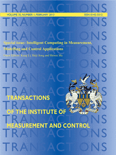
TRANSACTIONS OF THE INSTITUTE OF MEASUREMENT AND CONTROL
Shaping the Future of Measurement and Control MethodologiesTRANSACTIONS OF THE INSTITUTE OF MEASUREMENT AND CONTROL, published by SAGE Publications Ltd, is a prestigious journal that has been at the forefront of research in measurement and control since its inception in 1979. With its ISSN 0142-3312 and E-ISSN 1477-0369, this UK-based journal is indexed in reputable databases, showcasing its impact in the field, highlighted by a notable Q2 ranking in Instrumentation for 2023. The journal serves as a vital platform for scholars and practitioners alike, publishing high-quality, peer-reviewed articles that span a range of topics related to measurement technology and control systems. With an increasing focus on interdisciplinary approaches, TRANSACTIONS OF THE INSTITUTE OF MEASUREMENT AND CONTROL strives to advance the understanding and application of innovative measurement and control methodologies, making it an essential resource for academics, industry professionals, and students aiming to enhance their knowledge and expertise in this dynamic field. Although it operates under a traditional subscription model, the journal's commitment to disseminating cutting-edge research remains unwavering, inviting contributions that push the boundaries of instrumentation and control science.
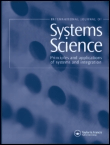
INTERNATIONAL JOURNAL OF SYSTEMS SCIENCE
Advancing Knowledge in Systems ScienceThe INTERNATIONAL JOURNAL OF SYSTEMS SCIENCE, established in 1970 and published by Taylor & Francis Ltd, stands at the forefront of research in the domains of Computer Science Applications, Control and Systems Engineering, and Theoretical Computer Science. With an impressive H-index and consistently ranked in the Q1 category across its relevant fields for 2023, this journal serves as a vital resource for researchers, practitioners, and students alike. It holds significant impact in the academic community with Scopus rankings placing it in the 86th percentile for Theoretical Computer Science and the 83rd percentile for Control and Systems Engineering. The journal's commitment to disseminating high-quality research fosters innovation and collaboration, making it an essential platform for advancing knowledge and application in systems science. Readers can access a wealth of articles that delve into both theoretical explorations and practical applications, thereby contributing to the ongoing dialogue in this dynamic field.

Control Theory and Technology
Driving Excellence in Control Theory and Systems EngineeringControl Theory and Technology, an esteemed journal published by SPRINGER MEDIZIN VERLAG GmBH, serves as a vital platform for the dissemination of cutting-edge research in the fields of control theory, systems engineering, and optimization. With an ISSN of 2095-6983 and E-ISSN of 2198-0942, this journal, which has been operational since 2014, reflects a strong commitment to advancing knowledge within various disciplines, including Aerospace Engineering and Signal Processing, as indicated by its impressive 2023 Scopus rankings and quartile placements. Positioned in Q2 and Q3 categories across multiple engineering and mathematical disciplines, the journal promotes rigorous peer-reviewed articles that explore innovative applications and theoretical developments. Although it does not offer open access, the quality and relevance of the content presented make it an essential resource for researchers, professionals, and students seeking to deepen their understanding and contribute to the rapidly evolving landscape of control technology.
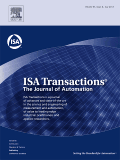
ISA TRANSACTIONS
Advancing the Frontiers of Engineering and TechnologyISA TRANSACTIONS, published by Elsevier Science Inc, is a premier academic journal that serves as a vital platform for advancing knowledge in the fields of Applied Mathematics, Computer Science Applications, Control and Systems Engineering, Electrical and Electronic Engineering, and Instrumentation. With an impressive H-index reflecting its scholarly impact, the journal is recognized in the top quartile (Q1) across its categories as of 2023, showcasing its significance within these disciplines. The journal boasts a robust Scopus ranking, placing it amongst the top journals globally—ranked #16 in Applied Mathematics and #6 in Instrumentation—highlighting its influence and reputation. ISA TRANSACTIONS not only contributes to theoretical advances but also addresses practical applications in engineering and technology, making it essential reading for researchers, professionals, and students seeking to stay at the forefront of innovation. Published continuously since 1968, it promises to remain a cornerstone for future research until at least 2024, fostering academic discourse and collaboration in a rapidly evolving technical landscape.

AUTONOMOUS ROBOTS
Leading the Charge in Autonomous Robotics Research.AUTONOMOUS ROBOTS, published by SPRINGER, is a leading academic journal that serves as a pivotal platform for the dissemination of cutting-edge research in the field of Autonomous Robotics. With an ISSN of 0929-5593, this esteemed journal has been at the forefront of innovation since its inception in 1994, and it continues to thrive with a vision extending to 2024 and beyond. Recognized in the Q1 category of Artificial Intelligence, it boasts a commendable ranking of #85 out of 350 in Computer Science and Artificial Intelligence, positioning it within the 75th percentile of researchers' preferred publications. The journal features a range of subjects related to autonomous systems, including but not limited to robot perception, action planning, multi-agent systems, and autonomous interactions, catering to an audience that spans researchers, industry professionals, and students alike. Scholars can access a wealth of peer-reviewed articles that contribute to both theoretical frameworks and practical applications, ensuring the relevance of the work published within its pages. Located in Dordrecht, Netherlands, AUTONOMOUS ROBOTS exemplifies a commitment to advancing the science of robotics, making significant contributions to the knowledge base and inspiring new developments within the field.

Evolving Systems
Unleashing Potential in Evolving Systems ResearchEvolving Systems, an esteemed journal published by Springer Heidelberg, focuses on advancing the interdisciplinary field of evolving systems, encompassing areas such as computer science applications, control and optimization, control and systems engineering, and modeling and simulation. Since its inception in 2010, the journal has made significant contributions to the academic community, currently holding a commendable Q2 ranking across multiple categories for the year 2023. With an impactful focus on the dynamic behaviors of systems and their adaptive methodologies, Evolving Systems serves as a crucial platform for researchers, professionals, and students aiming to explore and expand the boundaries of system evolution. Despite being a subscription-based journal, it remains committed to fostering high-quality research dissemination and encourages submissions that push the envelope of knowledge in this rapidly developing field. The journal employs a rigorous peer-review process, ensuring the publication of cutting-edge research that meets the highest scholarly standards.
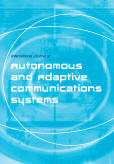
International Journal of Autonomous and Adaptive Communications Systems
Fostering Knowledge in Autonomous and Adaptive CommunicationInternational Journal of Autonomous and Adaptive Communications Systems, published by INDERSCIENCE ENTERPRISES LTD, serves as a vital platform for researchers and professionals engaged in the dynamic fields of autonomous systems and adaptive communication technologies. Since its inception in 2008, this peer-reviewed journal has contributed to the advancement of knowledge within the realms of Computer Science and Electrical and Electronic Engineering, albeit currently positioned in the Q4 quartile, suggesting substantial opportunities for growth and influence within these disciplines. With an emphasis on innovative research tackling challenges in autonomous communication frameworks, the journal invites submissions that explore the convergence of various technologies and their applications. While the journal does not offer open access, it remains a significant resource for academia and industry at large, facilitating collaboration and dialogue among emerging scholars, seasoned experts, and applied practitioners in the UK and beyond. The journey of this journal from 2008 to its ongoing publications through 2024 reflects a commitment to fostering academic discourse in this essential area of study.
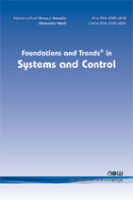
Foundations and Trends in Systems and Control
Bridging Theory and Practice in Systems EngineeringFoundations and Trends in Systems and Control is a premier academic journal dedicated to advancing the fields of control and systems engineering. Published by NOW PUBLISHERS INC, this journal has established itself as an essential resource since its inception in 2014, converging groundbreaking research and theoretical developments with practical applications. With an impressive impact factor reflected by its Q1 ranking in both the Control and Optimization and Control and Systems Engineering categories, it holds a significant position in the academic landscape, being ranked #3 among 130 in Control and Optimization and #12 among 321 in Control and Systems Engineering as per Scopus metrics. The journal prioritizes the dissemination of high-quality, peer-reviewed articles that are pivotal for researchers, professionals, and students seeking in-depth insights into the latest methodologies and trends in systems and control. Foundations and Trends in Systems and Control remains committed to fostering innovation and bridging theory with practice, paving the way for future advancements in the discipline.
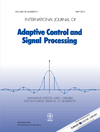
INTERNATIONAL JOURNAL OF ADAPTIVE CONTROL AND SIGNAL PROCESSING
Unveiling New Horizons in Adaptive Control and Signal ProcessingINTERNATIONAL JOURNAL OF ADAPTIVE CONTROL AND SIGNAL PROCESSING, published by Wiley, is a premier peer-reviewed journal dedicated to the advancing field of adaptive control and signal processing. With a consistent publication history since 1987, this journal serves as a critical platform for disseminating innovative research and developments that contribute to both theoretical and practical aspects of engineering disciplines, specifically within the realms of control systems, electrical engineering, and signal processing. Boasting a commendable impact with quartile rankings in Q2 for Control and Systems Engineering, Electrical and Electronic Engineering, and Signal Processing, it ranks #93 among 321 journals in Control and Systems Engineering with a 71st percentile in Scopus rankings, underscoring its significance in fostering academic excellence. Although it does not offer open access, the journal is accessible through institutional subscriptions and individual purchases, promoting an extensive reach to researchers, professionals, and students eager to stay at the forefront of adaptive technologies. Whether seeking to explore cutting-edge methodologies or to gain insights into real-world applications, readers will find this journal to be an invaluable resource in the dynamic landscape of engineering innovation.
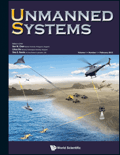
Unmanned Systems
Connecting Researchers to the Future of Unmanned SystemsUnmanned Systems is a leading academic journal published by WORLD SCIENTIFIC PUBL CO PTE LTD based in Singapore, that serves as a premier platform for research and advancements in unmanned vehicle technology. Covering a broad range of disciplines, the journal ranks in the Q1 category for Aerospace Engineering, Automotive Engineering, Control and Optimization, and Control and Systems Engineering as of 2023, showcasing its high impact within these fields. With impressive Scopus rankings placing it in the top tiers of its categories—8th in Control and Optimization and 14th in Aerospace Engineering—Unmanned Systems stands out as a vital resource for researchers, professionals, and students eager to explore current trends and innovations. While the journal operates under a traditional access model, it remains committed to disseminating quality original research, reviews, and case studies that contribute significantly to the understanding and application of unmanned technologies from 2013 through 2024.